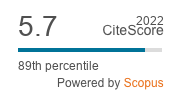The recent interest in using insects as food and feed is based on their capacity to be a sustainable alternative to other protein sources. When farmed as mini livestock, the question is raised as to whether they are ‘sentient beings’ (self-conscious)? In researching this topic, the problem is that humans often expect animals to have the same subjective experience as we do (anthropomorphic) and consider themselves as the centre of the universe (anthropocentric). We discuss insects’ sentience by looking at their brain, behaviour, and communicative abilities. The miniature brains of insects seem to be arranged in a very efficient functional way due to their very long evolutionary history. As for their behaviour, insects are capable of social and associative learning. Even dopamine, a neurotransmitter involved in reward and pleasure, plays a role. Human communication is mainly verbal, while for insects other means of information exchange are more important, such as tactile, chemical, visual, and vibrational. The distinction needs to be made between nociception and pain, the latter being an emotional experience. It is difficult to prove that insects can experience pain, although they have a large repertoire of withdrawal and defensive behavioural responses. The philosophical attitudes deal with how we view insects and their relations to humans. This also determines the ethical attitude and how we should treat them. Are they just there for our benefit or do we consider them as co-animals? Insects as food requires that many insects must be killed. However, the number killed may not be different when one chooses a plant-based diet. It is concluded that insects should be farmed and killed using the precautionary principle, which assumes that they can experience pain. To discuss the consequences for the industry sector that produces insects for food and feed, we used Brambell’s five freedoms as a framework.
REVIEW ARTICLE
Welfare of farmed insects
A. van Huis Related information
1Laboratory of Entomology, Wageningen University & Research, Droevendaalsesteeg 1, 6708 PB Wageningen, the Netherlands.
*Corresponding author: arnold.
*Corresponding author: arnold.
Journal of Insects as Food and Feed: 7
(5)- Pages: 573 - 584

Published Online: November 16, 2020
Abstract
Keywords: edible insects, ethics, invertebrate welfare, nociception, pain
2022 Journal Impact Factor
5.7
source: Journal Impact Factor 2023™ from Clarivate™

Institutional Offers
For institutional orders, please contact [email protected].
Purchase Options
-
G. Daş, M.M. Seyedalmoosavi, K. Schleifer, M. Mielenz and C.C. Metges
-
-
M. Barrett, S.Y. Chia, B. Fischer and J.K. Tomberlin
-
D.G.A.B. Oonincx and M.D. Finke
-
G. Bosch and K.S. Swanson
-
K.B. Barragan-Fonseca, M. Dicke and J.J.A. van Loon
-
A. van Huis
-
M. Tschirner and A. Simon
-
S. Kelemu, S. Niassy, B. Torto, K. Fiaboe, H. Affognon, H. Tonnang, N.K. Maniania and S. Ekesi
-
S. Diener, C. Zurbrügg and K. Tockner
Now available: Open Access JIFF Special Issue as follow-up of the book 'Insects as food and feed: from production to consumption'
read more




